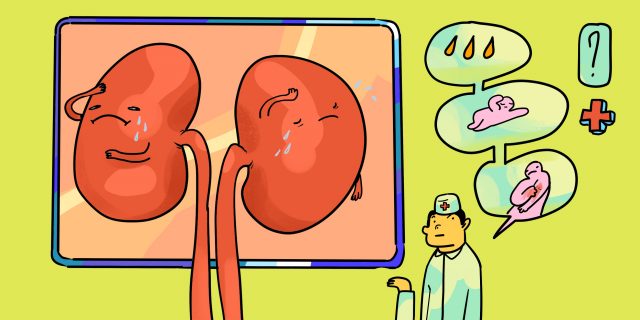The buds resemble two fist-sized beans. They are located just below the rib cage on either side of the spine.
Every minute, healthy kidneys filter about half a cup of blood to remove waste and excess water through urine. They also maintain the balance of minerals and nutrients in the blood, produce hormones, control blood pressure and red blood cell count, and help maintain healthy bones.
1. Foam in urine
Sometimes foam appears due to strong urine pressure. And that's okay. But if other symptoms listed in the article are added, it’s time to worry.
Foam usually indicates the presence of protein or toxic substances in the urine. This is caused by improper functioning of the kidneys, impaired excretion and filtration of various compounds and components of the blood.
2. Pink, red or brown urine
Normal urine color ranges from pale yellow to dark amber. Foods such as beets, berries and beans, and medications can change it. They color urine orange, pink, brown, red, and even greenish-blue.
The problem is that blood can make urine reddish, and this is already very bad. So, if you notice this classic symptom of kidney disease, run to the doctor.
3. Cloudy urine
It may be a symptom of kidney stones or a urinary tract infection.
Another reason for loss of clarity is dehydration: urine simply becomes more concentrated. As soon as you notice this, try to drink more water. If the urine becomes clear again and no other symptoms appear, everything is fine. If not, go see a nephrologist.
4. Lower back pain
Kidney pain is usually felt in the back - under the ribs, to the right or left of the spine. It can also spread to other areas - the abdomen or groin.
This symptom is sometimes confused with pain in the lumbar spine. And that's bad. In order not to start the disease, it is important to seek professional help in time.
5. Chronic fatigue, weakness
The kidneys produce erythropoietin, a hormone that regulates the formation of red blood cells. If there is not enough of it, anemia, weakness, and fatigue appear. And this is a serious reason to check your kidneys.
6. Headaches or dizziness
Toxins accumulated in the body due to kidney dysfunction interfere with normal brain function. This leads to problems with memory and concentration, dizziness, and headaches. Tasks that you previously completed with ease become difficult and require a lot of effort.
The above are signs of anemia and inflammation associated with impaired kidney function. If symptoms recur periodically, you need to check the urinary system.
7. Nausea and vomiting
If youvomitduring or after eating, but it is not due to poisoning or indigestion, check your kidneys. Perhaps they cannot cope removing harmful substances.
Just in case, make an appointment with your GP to rule out other causes of nausea. And then go to the nephrologist.
8. The need to urinate more often
It can cause a disease of any part of the urinary system. But if we talk about the kidneys, it could be an infection (pyelonephritis), the formation of stones, or a violation of one of the important functions - maintaining fluid balance in the body.
9. Swelling
They appear when fluid is retained in the body. The most noticeable swelling is in the legs and areas around the eyes.
Swelling in itself does not mean that you are sick. Perhaps you simply ate a lot of salty food, sat in one position for a long time, or took some kind of medication. Women may retain water before menstruation and during pregnancy.
If swelling is a constant problem for you, then it may be related to kidney disease.
10. Dry itchy skin
When the kidneys are unable to maintain the balance of minerals and nutrients in the blood, as well as get rid of toxins and excess fluid, problems can occur skin
Of course, there are many harmless causes for itching and dryness . For example, bathing in hot water, harsh soap, exposure to the sun. There’s definitely no point in panicking and blaming everything on your kidneys, but you need to get checked just in case.
11. A sharp increase in blood pressure
The kidneys are one of the links in the human hormonal system, which regulates the pressure and volume of blood in the body. Therefore, their improper functioning can cause an attack of hypertension.
However, this symptom indicates kidney disease only if you have other symptoms described.
12. Change in body temperature
Permanentchillseven in warm weather and an unexplained increase in temperature are also symptoms of kidney disease.
Denis Volodin notes that the temperature rises when inflammation begins. This happens, for example, with pyelonephritis.
Chills are caused by anemia, which we have already discussed above.
What to do if you notice these symptoms
Go to a nephrologist or urologist, undergo an examination, take urine and blood tests.
Many people, having passed a general urine test and received good results, calm down: everything is fine with their kidneys. And in vain. Because this analysis is not indicative for diagnosis. To be sure about the functioning of your kidneys, you need to take tests not only of your urine, but also of your blood once, or better yet, twice a year. They will help check the condition of your kidneys.
Most kidney diseases can be treated but can cause dangerous complications. Therefore, do not ignore the signs described.



0 Comments